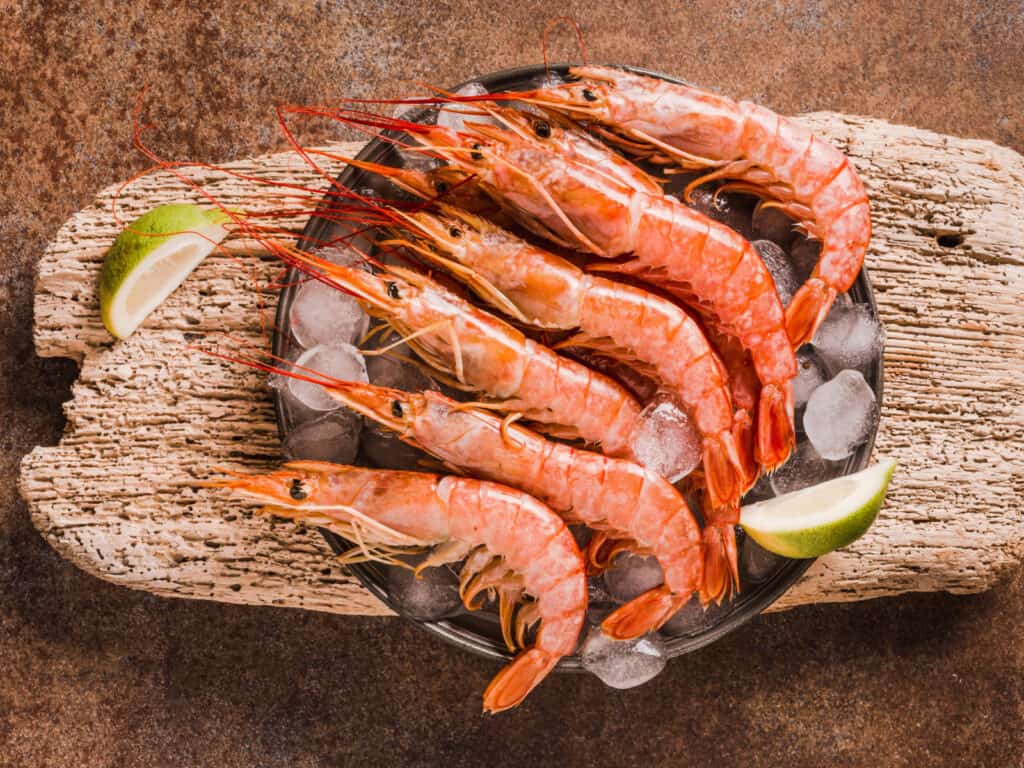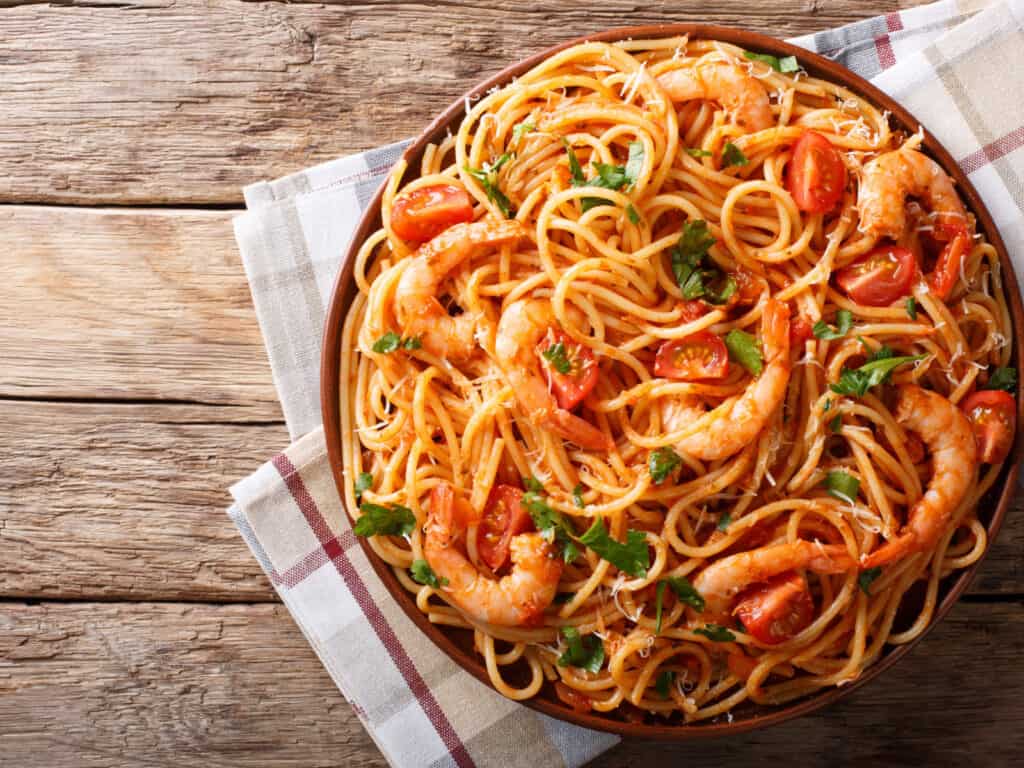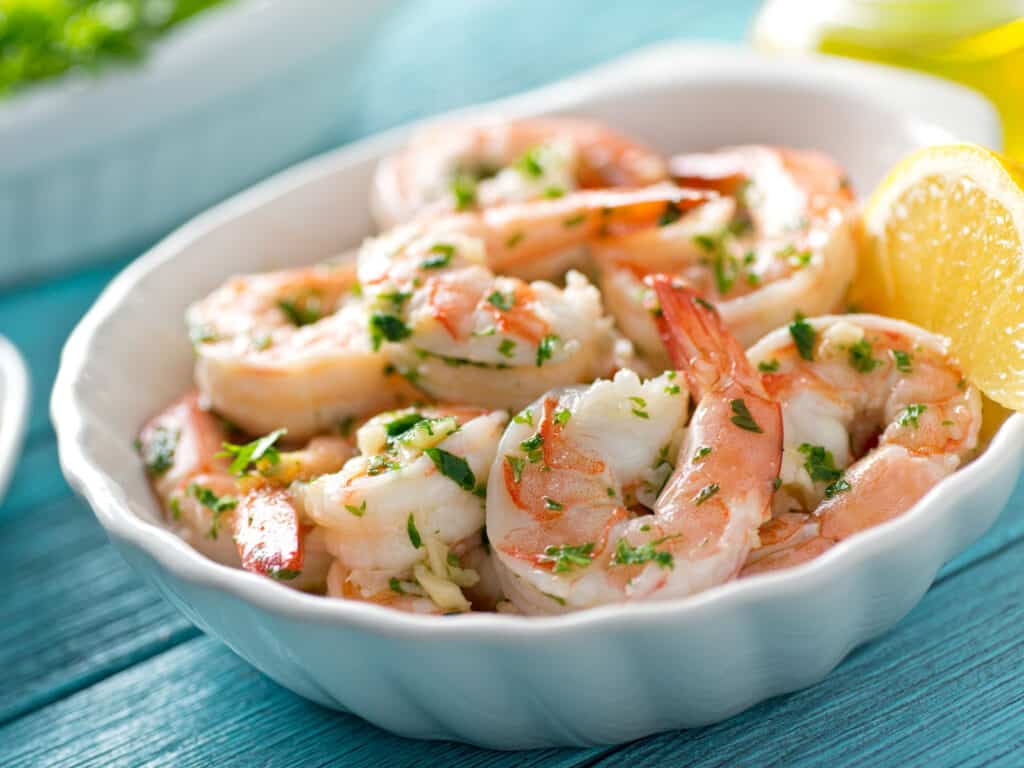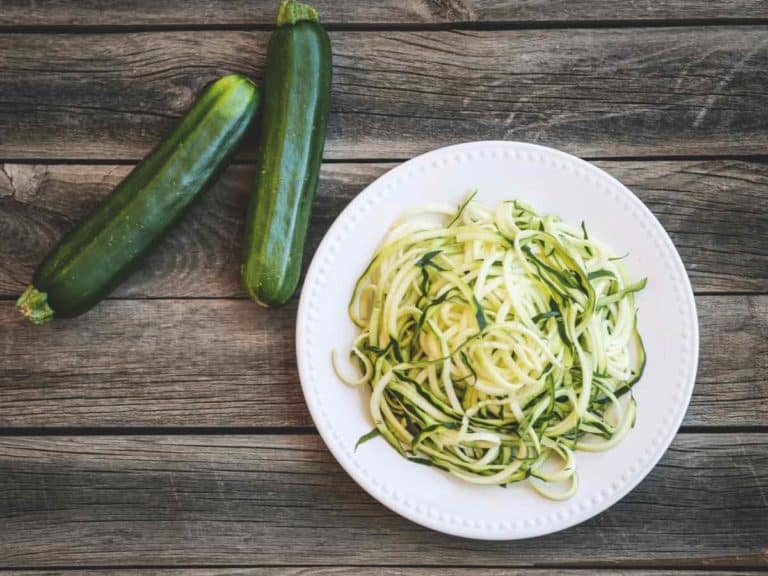Why Shrimp is Good for You: 9 Reasons
Some types of seafood are simply more accessible to everyday consumers than the rest. At most grocery stores, you can easily get your hands on frozen shrimp — or sometimes even fresh shrimp. It’s also easy to store and cook, making it trouble-free to welcome to the kitchen and add to the diet on a regular basis.
And you should make it a habit to cook and enjoy shrimp more often if you are a health-conscious person because it’s good for you not only physically but mentally, too!
1. Shrimp May Lower Cancer Risk
A report by the American Cancer Society (ACS) says that, after heart disease, cancer is the second most common cause of death in the US, with lung cancer responsible for the most deaths. As a matter of fact, health authorities say that the disease is expected to kill around 1,670 people a day in the country.
Between 30% and 50% of all cancer cases are preventable, says the World Health Organization (WHO).
The regular inclusion of antioxidant-rich foods in the diet may help keep cancer at bay. That’s because the antioxidants they contain abundantly can protect healthy cells from mutating and becoming cancerous.
Simply put, antioxidants are molecules capable of neutralizing excess free radicals, which are unstable atoms that are out to cause damage to the cells.

Free radicals are byproducts of metabolic processes in the body.
But they can come from external sources, too, such as cigarette smoking and exposure to radiation, air pollutants and industrial chemicals.
By consuming foods with antioxidants, those harmful free radicals can be stopped in their tracks!
Many foods that come from nature instead of the manufacturing plant are rich in antioxidants. And some of them are supplied by the ocean, including shrimp.
There are numerous types of antioxidants. The kind that’s present in good amounts in shrimp is called astaxanthin, which comes from algae the seafood consumes.
So, in other words, shrimp cannot produce antioxidants — any antioxidant it possesses comes from its diet. And the inclusion of shrimp in your diet lets you benefit from them.
In order to really lower your risk for cancer, eat not only shrimp but also fruits and vegetables, all of which are rich in antioxidants. Of course, leading a healthy lifestyle is a must, too.
Read Also: Here’s What Makes Astronauts Crave Shrimp
2. May Help Maintain a Healthy Heart
Some health-conscious people, in particular those who want to make sure that their tickers will keep ticking for as long as possible, tend to steer clear of shrimp. That’s because the seafood is rich in cholesterol, which, in excessive amounts, can clog the arteries and increase one’s risk of heart attack and stroke.
It’s true that shrimp is high in cholesterol — 12 large shrimp already pack about 130 milligrams of cholesterol. The United States Department of Agriculture (USDA) says that the same amount should be your limit per day.
Despite this, consuming shrimp is actually good for your heart if you eat it in moderation.
What makes shrimp heart-friendly is the fact that it’s loaded with omega-3 fatty acids. Don’t let the word “fatty” in the name intimidate you — this nutrient is so good for the cardiovascular system that it may help prevent heart disease. That’s because omega-3 fatty acids help lower bad cholesterol and at the same time increase good cholesterol.

But the heart-related benefits of omega-3 fatty acids present plentifully in shrimp do not begin and end there. According to scientists, they also help reduce inflammation, which is something that can kill you.
Inflammation damages the inner walls of the arteries. This makes it easy for plaque to form and cause clogging.
In addition, it can also trigger the formation of blood clots which can cause a heart attack or stroke, depending on whether it impedes circulation to the heart muscles or the brain.
Read Also: What Color Should Shrimps Be When Cooked
3. May Promote Healthy Weight Loss
The regular addition of shrimp to a healthy and well-balanced diet may help keep excess pounds at bay. That’s because the seafood is low in calories and carbohydrates, which, in excessive amounts, are associated with unwanted weight gain. Meanwhile, it’s low in those that may help speed up the shrinking of the waistline.
Here’s the calorie and carbohydrate content of a 3-ounce (85-gram) serving of shrimp, which contains 5 to 7 pieces of the nutritious and delicious treat:
- Calories: 90
- Carbohydrates: 0.77 grams
In the world of weight loss, these figures are impressively low!
While shrimp is low in both calories and carbohydrates, it’s high in protein — the same serving of shrimp packs 17.26 grams of protein. Needless to say, shrimp is loaded with the nutrient that helps build lean muscles.
Especially if the goal is to accomplish your weight loss goal as quickly as possible, having lean muscles is a definite must.
Lean muscles burn a lot of calories each time they spring into action as well as when maintaining themselves. Fitness experts, as a matter of fact, say that a pound of lean muscles burns up to 6 calories per day just resting!
It’s not just the lean muscle-building property of protein that makes the nutrient in shrimp great for those who wish to eliminate excess pounds.
Protein is also highly satiating because it takes a longer time to digest. Due to this, it suppresses the appetite, thus keeping a weight-watcher from eating more than he or she should.
Shrimp is a good source of iodine, too. This nutrient is needed by the thyroid gland, which is responsible for regulating the metabolic rate. We will talk about the said gland in a few — so keep reading!
Read Also: How to Steam Frozen Shrimp in 8 Steps or Less
4. May Slow Down Skin Aging
Earlier, we discussed the fact that shrimp may help lower the risk of cancer, including skin cancer. The addition of the seafood to your diet regularly may benefit your skin in an entirely different way — by safekeeping it from damage caused by excessive sun exposure and the natural aging process.

Astaxanthin, the primary antioxidant in shrimp, can reach the epidermis, the outermost layer of the skin. Together with melanin, which is a dark-colored pigment, astaxanthin shields healthy skin cells from the sun’s UV rays.
UV rays are bad because not only can they increase skin cancer risk but also promote skin damage.
Beauty-conscious individuals can benefit tremendously from the regular consumption of shrimp as it may help fend off premature skin aging, which can cause wrinkles, sagging, age spots and excessive dryness.
The various indicators tend to show up most where the skin is thin and prone to sun exposure, such as the area around the eyes.
Shrimp also contains selenium. As a matter of fact, it’s so rich in the said nutrient that, according to nutritionists, it provides almost 100% of your recommended daily value of selenium.
Due to its antioxidant properties, selenium in shrimp and other food sources helps prevent the appearance of dark spots as a result of free radical damage on skin cells. It also plays a role in keeping the skin elastic, which is crucial in keeping it plump and preventing it from sagging.
Selenium is also important in keeping the nails strong and the mane beautiful.
Read Also: Right Way to Microwave Shrimp
5. May Improve Eye Health
It’s not just the skin that astaxanthin in shrimp can protect from those damaging UV rays but the eyes, too.
According to an American Academy of Ophthalmology (AAO) report, UV rays, whether from the sun or artificial indoor sources, can cause damage to the eye’s surface tissues as well as the cornea and lens.
Each time you bask in the sun without protection, you are increasing your risk of cataracts and eye cancers.

Another serious eye problem that the intake of shrimp may help fend off is age-related macular degeneration (AMD). While the name implies that AMD is due to aging, its development can be accelerated by too much sun.
A report by the Cleveland Clinic says that AMD is the primary cause of loss of vision in people over 50 years of age. Those with AMD lose their central vision, which makes them unable to see things directly in front of them. Even though it does result in blindness, nonetheless, AMD can greatly impact a person’s everyday living.
Besides excessive sun exposure, other risk factors for AMD include:
- A family history of AMD
- Cigarette smoking
- High blood pressure or hypertension
- Being overweight or obese
- A diet that’s high in saturated fats
Donning hats and sunglasses, in particular a high-quality pair that blocks at least 99% to 100% of the sun’s UV rays, is highly recommended by eye experts.
It will also help a lot if foods rich in nutrients necessary for eye health are regularly added to the diet, including shrimp with powerful eye-protecting astaxanthin.
6. May Support Normal Thyroid Functioning
While talking about the weight loss perks of shrimp earlier, I mentioned the thyroid gland.
Situated in the neck, the thyroid gland produces a couple of hormones: thyroxine (T4) and triiodothyronine (T3).
These chemicals are responsible for regulating metabolism, which controls a number of bodily processes. Some of them include heart rate, blood sugar, temperature, digestion and bone development.
For the thyroid gland to be able to produce just the right amount of hormones, it needs iodine. As mentioned earlier, there’s a good amount of iodine present in shrimp.
Getting too little iodine from the diet, needless to say, can keep the thyroid gland from producing enough hormones. When this happens, hypothyroidism occurs.
The medical condition may not cause any signs or symptoms during the early stages. Once it worsens, however, it can become a serious and life-threatening matter if not treated promptly.
Some of the signs and symptoms of hypothyroidism include:
- Depression
- Insomnia
- Trouble concentrating
- Fatigue
- Excessive tiredness
- Joint and muscle pain
- Skin and hair dryness
- Sensitivity to cold temperature
- Frequent and heavy periods
- Decreased libido
- Constipation
- Unwanted weight gain
- Increased cholesterol levels
Myxedema — it’s what happens when the levels of thyroid hormones in the body drop to dangerously low levels. This should not be taken sitting down as it can lead to coma and heart failure.

Some forms of hypothyroidism are due to insufficiency of iodine in the diet. Needless to say, the consumption of iodine-rich foods in the diet is recommended. Some of the best dietary sources of iodine are seafood such as sea vegetables like seaweed and algae as well as tuna, salmon, cod, scallops, oysters and, of course, shrimp.
7. May Encourage a Healthy Mind
By now, you already know that astaxanthin is one of the things that makes shrimp healthy. We have already talked about how the said antioxidant may lower the risk of cancer and eye problems as well as delay skin aging.
There’s one more health perk that astaxanthin in shrimp brings that we need to discuss: how it’s good for your brain.
Scientists say that astaxanthin can cross the blood-brain barrier. As a result of this, it has access to hard-to-reach areas of the brain and can do what it does best, which is protecting cells from damage.
The hippocampus, whose task is to store memory, is prone to damage by both free radicals and glucose.
Adding shrimp to the diet supplies your brain with ample amounts of astaxanthin, thus helping to protect the hippocampus and, ultimately, your memory.
As a matter of fact, based on a study, participants who received astaxanthin orally showed significant improvements in memory recall compared to those who received a placebo.
Earlier, it was mentioned that the presence of omega-3 fatty acids in shrimp is what makes the seafood heart-friendly. Well, it’s also something that makes shrimp good for the mood.
An article published by the National Library of Medicine (NLM) says that insufficiency in omega-3 fatty acids is linked to mood disorders and supplementation of the said nutrient is a therapeutic strategy.
In the US, a common mood disorder in the US is major depression, and it’s estimated that 19.4 million Americans had at least an episode of it in 2019.
Shrimp is also rich in zinc, which is good for the mind, too. Being deficient in this mineral, say mental health experts, may produce depression- and anxiety-like symptoms.
8. May Prevent Osteoporosis
It’s no secret that calcium is important for keeping the bones strong and healthy. But if you believe that it’s the only nutrient necessary to fend off fractures, think again.
There are nutrients that help calcium do its job.
Some of them, for instance, help calcium penetrate the bones, while others help make sure that calcium stays in the bones.
Magnesium, phosphorus, selenium, vitamin D — apart from calcium, all of these nutrients are also needed by your bones. And you can obtain good amounts of them by adding shrimp to your diet.

The ultimate goal of keeping your bones in tip-top shape today is to lower your risk of osteoporosis tomorrow.
Simply put, osteoporosis is the weakening of the bones. It happens when the creation of new bone cells fails to catch up with the loss of old bone cells.
Not too many people are aware of the fact that the bone is a living tissue, which is constantly being broken down and replaced by the body.
According to a fact sheet by the National Osteoporosis Foundation (NOF), around 10 million Americans have osteoporosis and the bone disease is responsible for about 2 million fracture cases in the country per year.
Some risk factors for osteoporosis cannot be changed. They include age and gender — osteoporosis is more common in women and older adults. Others, meanwhile, can be changed such as quitting cigarette smoking, drinking alcohol moderately and leading an active lifestyle.
You can also lower your risk of suffering from the bone disease by having a diet that’s rich in calcium as well as other nutrients that help in keeping the bones strong and healthy.
9. May Relieve PMS and Menopause Symptoms
While menopause is a natural biological process that marks the end of a woman’s menstrual periods, it comes with an assortment of nasty symptoms. Some of them include hot flashes, insomnia and mood swings.
Omega-3 fatty acids in shrimp may help deal with these symptoms.

According to an investigation conducted by health experts from the Christiana Care Health Systems, supplementation with the said nutrient found in shrimp may help decrease the severity of hot flashes within 3 months.
On the other hand, numerous other studies have linked omega-3 fatty acids to improvements in both sleep and mood issues.
PMS is another reproductive system-related problem experienced by many women. Short for premenstrual syndrome, as many as 3 in 4 women experience it at some point in their lifetime.
Various symptoms are experienced during PMS, each one just as horrible as the other. Some common ones include those that affect the mood such as irritability, anxiety and depression. It’s also not uncommon for women with PMS to experience headaches, muscle aches, joint pains, cramps and insomnia.
Based on an article that appeared on the website of the Journal of Obstetrics and Gynecology Research (JOGR), omega-3 fatty acids, which you can get from shrimp, may help reduce the severity of PMS symptoms.
There is no denying that shrimp is good for you. However, as always, too much of a good thing is bad. Health authorities suggest sticking to 2 to 3 servings (8 to 12 ounces) of shrimp per week in order for you to be able to take advantage of the many health perks the seafood brings without risks.
Read Next: 16 Best Shrimp Substitutes [Regular, Vegetarian, non-shellfish]





